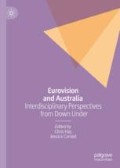Abstract
This chapter provides a historical survey of the involvement of Australians in the Eurovision Song Contest (ESC) and how this has reflected the cultural and political history of Australia and Europe. The first section demonstrates that Australia’s history in the ESC goes back to the very beginnings of the contest in the late 1950s, when Australia’s cultural and political orientations were still overwhelmingly British. The second section discusses the Australian multiculturalist policy behind the development of the multilingual, public service broadcaster, the Special Broadcasting Service (SBS), in the late 1970s. SBS began broadcasting the ESC in Australia in 1983 at a time when its content was mostly targeted at non-Anglophone European immigrant communities. The third section examines how the increase in immigration from Asian states to Australia from the 1970s has been reflected in the biographies of artists who have represented Australia in the ESC, as well as in SBS’s plans to establish a version of the ESC for Asia, making Australia a commercial and cultural bridge for the ESC between Europe and Asia.
Access this chapter
Tax calculation will be finalised at checkout
Purchases are for personal use only
Notes
- 1.
This definition was originally based on that adopted by the International Telecommunication Union in 1932, by which the EBA is bounded “to the North and West by the natural limits of Europe, on the East by the meridian 40° East of Greenwich and on the South by the parallel of 30° North so as to include the Western part of the U.S.S.R. and the territories bordering the Mediterranean, with the exception of the parts of Arabia and Hedjaz included in this sector” (International Radiotelegraph Conference 1933: 12).
- 2.
Ancestry is, however, difficult to quantify as the 2016 census only allowed for up to two ancestries per person, and there are many Australians who are of a more mixed ancestry. The census also asked for countries of birth and the languages spoken at home.
- 3.
For an explanation of the differences between active and associate membership in the EBU, see Zeller (1999: 72–82).
References
Ang, Ien, Gay Hawkins, and Lamia Dabboussy. 2008. The SBS Story: The Challenge of Cultural Diversity. Sydney: University of New South Wales Press.
Australian Bureau of Statistics. 2017. Cultural Diversity in Australia, 2016. Accessed 30 October 2018. http://www.abs.gov.au.
Bodey, Michael. 2016. Eurovision Audience Down on 2015. The Australian, May 16. Accessed 30 October 2018. http://www.theaustralian.com.au.
Carniel, Jessica. 2017. Welcome to Eurostralia: The Strategic Diversity of Australia at the Eurovision Song Contest. Continuum 1: 13–23.
———. 2018. Understanding the Eurovision Song Contest in Multicultural Australia: We Got Love. Basingstoke: Palgrave Macmillan.
Eugster, Ernest. 1983. Television Programming Across National Boundaries: The EBU and OIRT Experience. Dedham, MA: Artech House.
European Broadcasting Union. 2015. Australia to Make Eurovision Song Contest Return in 2016. EBU, November 17. Accessed 30 October 2018. http://www.ebu.ch.
Fricker, Karen. 2013. “It’s Just Not Funny Any More”: Terry Wogan, Melancholy Britain, and the Eurovision Song Contest. In Performing the ‘New’ Europe: Identities, Feelings, and Politics in the Eurovision Song Contest, ed. Karen Fricker and Milija Gluhovic, 53–76. Basingstoke and New York: Palgrave Macmillan.
International Radiotelegraph Conference. 1933. General Radiocommunication Regulations Annexed to the International Telecommunication Convention; Final Protocol to the General Radiocommunication Regulations; Additional Radiocommunication Regulations Annexed to the International Telecommunication Convention; Additional Protocol to the Acts of the International Radiotelegraph Conference of Madrid, Signed by the Governments of the European Region. London: His Majesty’s Stationery Office.
Moses, Dirk, ed. 2004. Genocide and Settler Society: Frontier Violence and Stolen Indigenous Children in Australian History. New York: Berghahn Books.
Phillips, A.A. 2005. On the Cultural Cringe. Melbourne: Melbourne University Press.
Pierpoint, George, and Kerry Allen. 2018. Chinese Broadcaster Censors LGBT Symbols at Eurovision. BBC, May 11. Accessed 30 October 2018. http://www.bbc.com.
Potter, Simon J. 2012. Broadcasting Empire: The BBC and the British World, 1922–1970. Oxford: Oxford University Press.
Sebag-Montefiore, Clarissa. 2015. Australia’s Affection for Eurovision Pays Off. BBC, February 28. Accessed 30 October 2018. http://www.bbc.com.
Vukov, Vice. 2003. Tvoja zemlja: sjećanja na 1971. Zagreb: Nakladni zavod Matice Hrvatske.
Vuletic, Dean. 2018. Postwar Europe and the Eurovision Song Contest. London: Bloomsbury.
Zeller, Rüdiger. 1999. Die EBU—Union Européene de Radio-Télévision (UER)—European Broadcasting Union (EBU): Internationale Rundfunkkooperation im Wandel. Baden-Baden: Nomos.
Author information
Authors and Affiliations
Corresponding author
Editor information
Editors and Affiliations
Rights and permissions
Copyright information
© 2019 The Author(s)
About this chapter
Cite this chapter
Vuletic, D. (2019). Australia and the Eurovision Song Contest: A Historical Survey. In: Hay, C., Carniel, J. (eds) Eurovision and Australia. Palgrave Macmillan, Cham. https://doi.org/10.1007/978-3-030-20058-9_2
Download citation
DOI: https://doi.org/10.1007/978-3-030-20058-9_2
Published:
Publisher Name: Palgrave Macmillan, Cham
Print ISBN: 978-3-030-20057-2
Online ISBN: 978-3-030-20058-9
eBook Packages: Literature, Cultural and Media StudiesLiterature, Cultural and Media Studies (R0)

